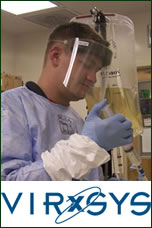VIRxSYS
Lentivirus Vector HIV Vaccine Reduces Viral Load in Monkey Study
 |
 |
 |
 |
 |
 |
 |
| SUMMARY:
VIRxSYS Corporation's investigational HIV vaccine candidate,
VRX1023 -- which uses a lentivirus vector in the same viral
family as HIV -- produced a strong immune response and was
associated with reduced viral load in SIV-infected macaque
monkeys, researchers reported in an oral session at the 17th
Conference on Retroviruses and Opportunistic Infections (CROI
2010) last month in San Francisco. |
|
 |
 |
 |
 |
 |
 |
 |
By
Liz Highleyman
 Many
HIV vaccines candidates use other viruses as "vectors" to
carry HIV genes or antigens that stimulate an immune response. One common
vector, adenovirus type 5 (Ad5; cause of the common cold), has demonstrated
strong immunogenicity (ability to provoke an immune response), but has
run into difficulties including pre-existing Ad5 immunity and other
problems, leading to suboptimal efficacy, as seen in the large STEP
trial.
Many
HIV vaccines candidates use other viruses as "vectors" to
carry HIV genes or antigens that stimulate an immune response. One common
vector, adenovirus type 5 (Ad5; cause of the common cold), has demonstrated
strong immunogenicity (ability to provoke an immune response), but has
run into difficulties including pre-existing Ad5 immunity and other
problems, leading to suboptimal efficacy, as seen in the large STEP
trial.
Franck Lemiale from VIRxSYS and colleagues at the University of Pennsylvania
School of Medicine looked at a different approach, using a lentivirus
vector. The lentivirus ("slow virus") family includes retroviruses
such as HIV itself and its simian equivalent SIV, but also many viruses
not known to cause disease in humans.
Lentiviruses
tend to be good at carrying genetic material into cells. The researchers
therefore created a recombinant (genetically engineered) vaccine called
VRX1023 consisting of a lentivirus vector carrying Gag, Pol, and Rev
genes from SIV.
Macaque monkeys received injections of either the experimental vaccine
or placebo, some of them after being "primed" with plasmid
(free-standing) DNA. At 6 months after the last vaccine or placebo dose,
the monkeys were "challenged" with a highly pathogenic strain
of HIV.
The researchers monitored how many monkeys became infected and used
a variety of laboratory assays to measure immune responses including
T-cell activation, levels of cytokines, and production of antibodies
against SIV and the lentivirus vector.
Results
 |
The
VRX1023 vaccine did not prevent monkeys from becoming infected with
SIV. |
 |
However,
vaccinated monkeys showed better control of the virus, as indicated
by a 95% reduction in SIV viral load compared with non-vaccinated
control animals. |
 |
No
adverse reactions were observed in any vaccinated animals after
multiple vaccine doses. |
 |
VRX1023
elicited immune responses, including SIV-specific CD8 T-cell responses
and production of anti-SIV antibodies. |
 |
T-cell
responses were seen in monkeys that received the lentivirus vaccine
with or without the DNA primer. |
 |
Additional
doses of the lentivirus vaccine did not increase production and
neutralizing antibodies against the vector itself, suggesting it
could be repeatedly administered without losing its effect. |
"We
are extremely encouraged by the results of this study," Lemiale
said in a press release issued by VIRxSYS. "The combination of
strong immune responses, viral control, and CD4 preservation is tremendous...It
will be very interesting to see how it performs as a therapeutic vaccine
in humans."
The company
indicated that it is currently preparing an Investigational New Drug
Application for the therapeutic use of the vaccine candidate in HIV
positive patients.
VIRxSYS
Corp, Gaithersburg, MD; University of Pennsylvania School of Medicine,
Philadelphia, PA.
3/12/10
Reference
F
Lemiale, M Morrow, L Shovlin, and others. Lentiviral Vector-based Anti-HIV-1
Vaccine Induces Strong T Cell and Antibody Responses in Macaques, with
and without DNA Priming. 17th Conference on Retroviruses & Opportunistic
Infections (CROI 2010). San Francisco. February 16-19, 2010. Abstract
81.
Other
source
VIRxSYS.
VIRxSYS Announces at CROI Promising Results from Its HIV Vaccine Study.
Press release. February 18, 2010.